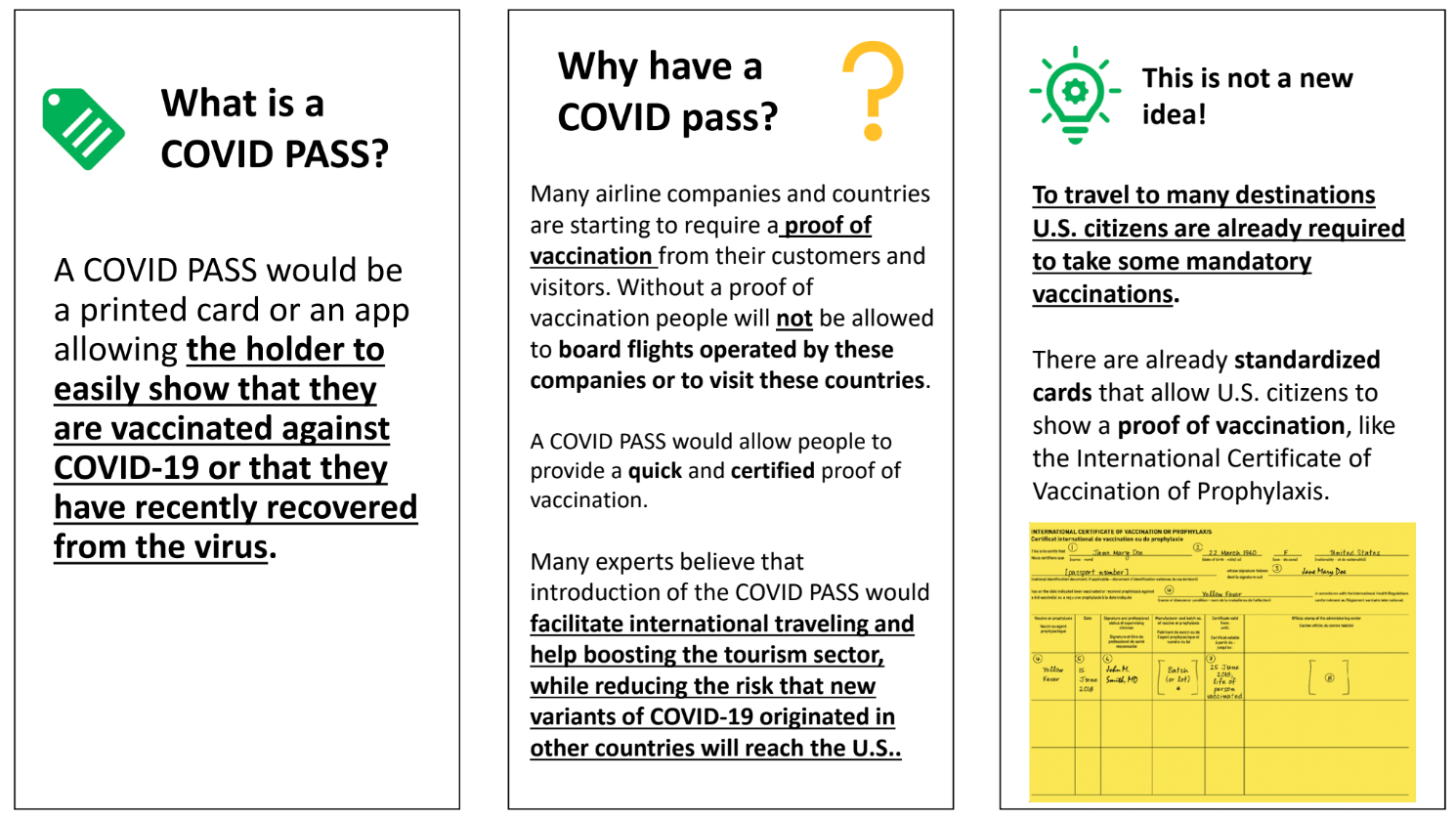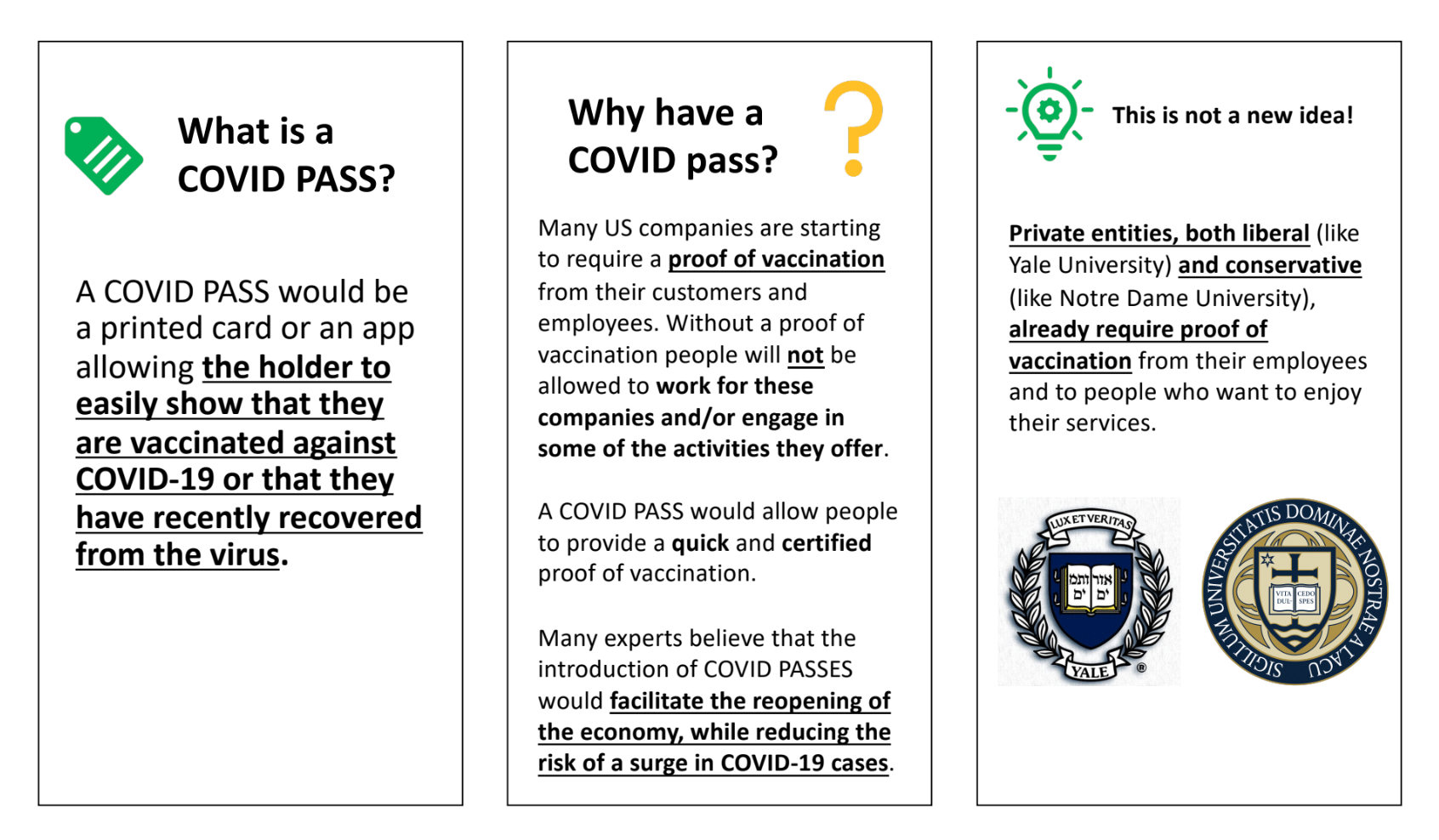Vaccine passports can be unpopular. Researchers from Bocconi, LSE and Yale carried out two experiments to explore how governments could persuade people of their merits.
Once called “the next political flashpoint” in the COVID culture wars, vaccine passports continue to spark controversy in the United States and worldwide. These ‘passports’ are electronic or paper vaccination certificates that allow vaccinated people to do certain things that the unvaccinated can’t. Some of them are “international”. For example, the European Commission has reached an agreement on the “Digital COVID Certificate”, which will provide proof that a person has been vaccinated against COVID, received a negative test result, or recently recovered from the virus. Others are “domestic”: some countries like Israel, Chile and France go as far as requiring proof of vaccination to take part in ordinary activities like attending shows or even circulating freely during general lockdowns.
If polarisation around the pandemic is bad enough, polarisation around vaccine passports is worse. Remember what happened with contact tracing apps: once presented as key to return to some kind of normalcy, they were ultimately doomed because people didn’t trust them. Vaccine passports could suffer the same fate. Although more coercive than contact tracing apps, their success ultimately depends on public support and cooperation. Imposing them on a sceptical public could trigger resistance, induce forgery, or even – as some preliminary research suggests – increase vaccine hesitancy. If vaccine passports are to be introduced at all, they had better enjoy public support.

We conducted two experiments to test whether some well-known behavioural tools could be used to increase support for passports while not decreasing vaccine uptake, nor furthering polarisation. Our results are heartening and suggest these techniques could be used to nudge people into other socially beneficial behaviours, while keeping polarisation at bay.
In our first experiment, we leveraged the status quo bias (that is, the tendency people have towards accepting a situation once it is framed as being the status quo rather than a change). In fact, immunity passports can easily be presented as not that much of a new idea. To travel to certain countries one has to show a yellow card – a World Health Organization-sponsored proof of vaccination against yellow fever. Domestic restrictions for the unvaccinated are also not radically innovative: schools and universities – even the most libertarian among them! – routinely ask for a list of mandatory vaccines to be on campus.
We ran two parallel survey experiments, one for the “international” passport and one for the “domestic” one (each with approximately 1,600 US American residents, recruited through Prolific.co in a non-representative sample). We randomly assigned half of respondents in each category to a control group and to a “status quo” group. To each control group, we explained the Covid Pass policy. To each status quo group, in addition, we showed that the passport was not a novel idea, using the examples of the yellow card and of universities respectively.
Figure 1: The explanation of the COVID Pass, with the yellow card example

Figure 2: The explanation of the COVID Pass, with the universities example

All the results were in the direction we anticipated. In both cases, the status quo group showed higher support for the pass than the control group. Furthermore, the status quo group stated a higher willingness to vaccinate than the control group. Finally, and perhaps most interestingly, the status quo treatment seems to have reduced polarisation between Democrats and Republicans (defined as the distance between their respective opinions towards the passport). This reduction seems to have worked mostly through softening conservatives’ opposition, which is consistent with the literature. The decrease was larger for the domestic pass, which could be explained by the fact that the treatment made explicit that both conservative and liberal institutions have required immunisation proof in the past. All our results are robust to a battery of controls and significant to the 1%.
In our second experiment, we built on the (quite incipient) literature on interaction among nudges to test whether two nudges could work together – or whether, as some authors suggest, they would “crowd each other out,” making them ineffective or even counterproductive. Again, we ran a survey experiment with 4,000 US residents, this time focusing only on international passports. We divided respondents evenly into four groups. To the control group, we showed the “international Covid pass” policy, and to the first treatment group we replicated the “status quo” treatment from the previous experiment. To the second treatment group, we leveraged the “peer effect,” telling respondents that only one third of Americans oppose immunity passports for international travel. Finally, we exposed the fourth group to both these treatments at once.
We observe that both nudges are effective in increasing the support for the pass, and they do not fuel vaccine hesitancy. Furthermore, we observe that their combined impact is stronger than any of them individually. In the case of vaccine passports, this suggests that policymakers would be well advised to use both these nudges simultaneously. Indeed, the finding that these two nudges are weakly addictive suggests that they could also be used in other policy areas.
This post represents the views of the authors and not those of the COVID-19 blog, nor LSE.
This post is based on Guidi, Sebastian and Romano, Alessandro and Sotis, Chiara, Depolarizing the COVID-19 Vaccine Passport (May 20, 2021). Yale Law Journal, Forthcoming, and Sotis, Chiara, Alessandro Romano, Renny Reyes, and Miriam Allena. 2021. “Covid-19 Vaccine Passport and International Traveling: The Combined Effect of Two Nudges on Americans’ Support for the Pass.” PsyArXiv. July 13. doi:10.31234/osf.io/dr75j






Interesting hypothesis. However vaccine passports in a domestic setting are not similar to the status quo. Furthermore there will be furious opposition to them that will also influence people. Essentially what is proposed here is deceipt, both groups are lied to as part of the nudge process. Obviously that is unethical. However outside of the controlled conditions of an experiment people will be exposed to alternative views and will be more likely to reject extreme authoritarianism.
This term “nudge” is a euphemism for psychological and emotional manipulation. Does it never occur to the authors of this article that the arguments for and against vaccination passes should be openly and rationally debated? We are not selling chocolate or detergent here, we should be giving people choices based on the evidence, not assuming there is only one point of view and it is just a matter of shepherding them all in one direction like so many sheep.
Two big caveats to note here.
(1) Yellow fever is a vaccine that the vast vast vast majority of Americans (and Brits) would never need to take. It’s not a reasonable precedent because the diseases are so dissimilar.
(2) There are religious exemptions for most universities and colleges that require immunisations. And this probably provides an ‘out’ for a lot of people. If the COVID pass did not have the same ‘out’, it might not receive the same support.
I strongly suspect the best way to go with young people who don’t want to vaccinate is to explain the risk-benefit trade off better. It’s quite clear this is not as obvious of a trade of as if you’re over 50. Young people (in the UK at least) have seen the AZ program cancelled for them over fears over blood clotting that likely rival COVID risks. The Pfizer vaccine also has its risks.
I think a good policy would be to offer free antibody tests to young people. This will chance the risk-benefit balance in their mind and may lead to more voluntary (rather than potentially coercive) strategies. We also need clearer communication on the benefits v risks.
Alex de Figueiredo
Vaccine Confidence Project.